10. Hitman 3 (PC)
9. Mundaun (PC)
8. Axiom Verge 2 (PC)
7. Halo Infinite (PC)
6. Metroid Dread (Switch)
5. Ratchet & Clank: Rift Apart (PS5)
4. Resident Evil Village (PC)
3. Psychonauts 2 (PC)
2. Inscryption (PC)
1. Deathloop (PS5)
2007-2012
10. Hitman 3 (PC)
9. Mundaun (PC)
8. Axiom Verge 2 (PC)
7. Halo Infinite (PC)
6. Metroid Dread (Switch)
5. Ratchet & Clank: Rift Apart (PS5)
4. Resident Evil Village (PC)
3. Psychonauts 2 (PC)
2. Inscryption (PC)
1. Deathloop (PS5)
I'm back. I didn't play a ton of new games in 2018, partly because some of the ones I did play were pretty long. These are the ones I liked the most.
Best of 2018
8. Donut County (Multi)

In Donut County, you control a hole in the ground that can move around and grows whenever an object falls into it. Your goal is to get every object, plant, animal, and even building in the level to fall into the hole. Then you go to the next location and do it again. Sometimes there are some simple puzzles involving using something that falls into the hole to cause something else to happen in the level. It's simple stuff, but it works because its story that moves from a raccoon dropping stuff down a hole because he feels like it to an anti-capitalist mission statement is a lot of fun, and there's a simple pleasure to be gained from watching a bunch of stuff fall down an ever expanding hole.
7. Red Dead Redemption II (Multi)
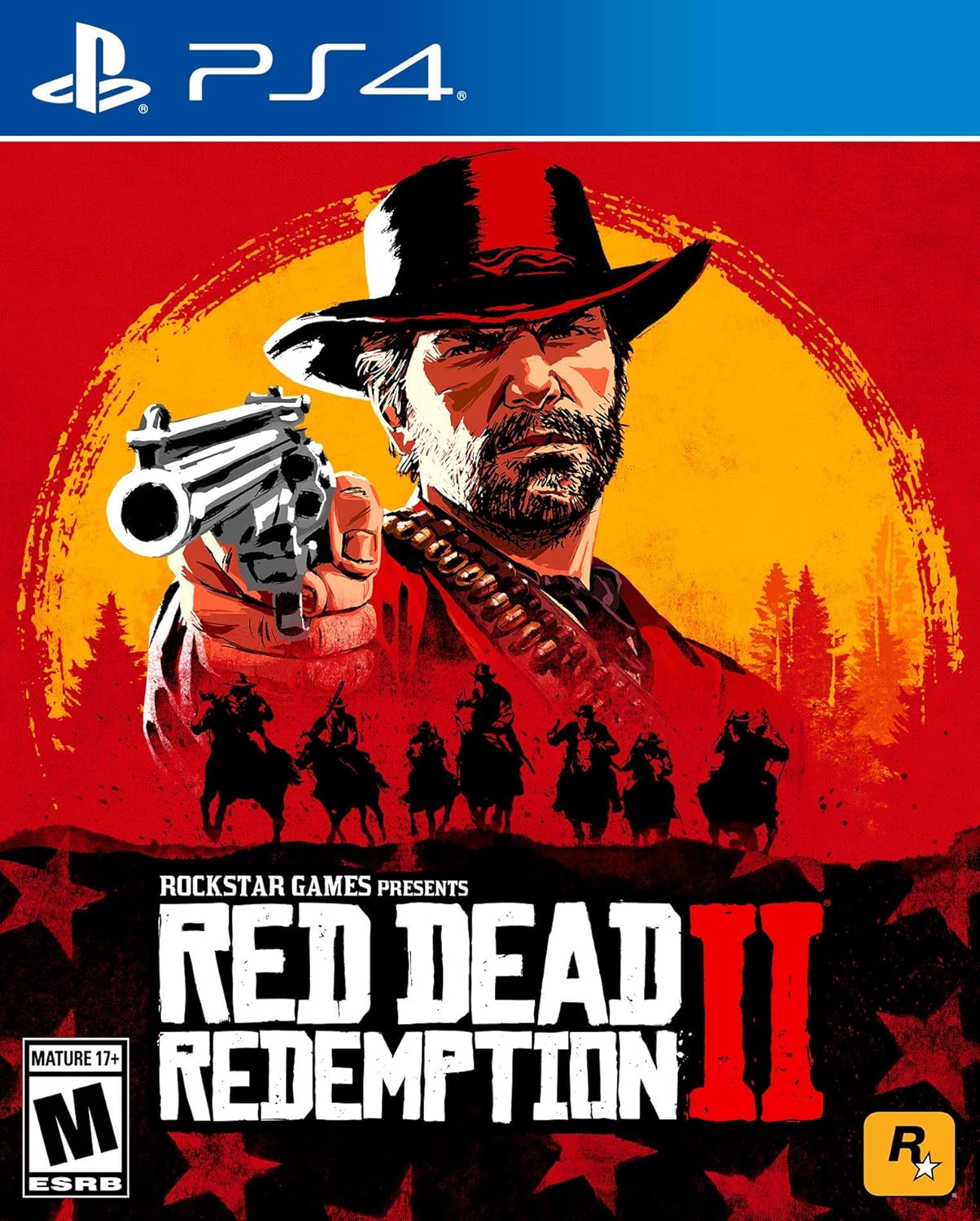
Rockstar started the trend of open world games many years ago, and it's interesting to see how they ignore the conventions that have grown into place since then as they continue to pursue their own vision of what games can be. Red Dead II is both incredibly vast in it scale and amazing impressive in its minute details. Its story rarely draws outside the lines of what you've seen in Westerns before, but it also is an effective tale about the decline of the natural world and the futility of vengeance. I just wish I had a bit more fun playing it. The gunplay in functional but rarely exciting, and there are tons of complex systems and minigames to engage in but little apparent reason to do so. If the game was shorter I would be more favorable toward it, but after dozens of missions entailing little more than riding a horse somewhere to shoot some guys, it was over long after I was ready for it to be. It's easier to admire Red Dead II than to enjoy it.
6. Super Smash Bros. Ultimate (Switch)

Ultimate is the most I've played a Smash Bros. game since the Gamecube iteration, due to both the smart decision to bring back every playable character the series has ever seen along with a fun collection of newcomers, and the entertaining (and quite long) story mode. It involves hundreds of little battles against characters from all across Nintendo's history, with each one having its rules tweaked to invoke what those characters are known for. Winning a battle unlocks a "spirit" of that character, which you can equip to boost your stats or give you an extra ability or item in the next battle. The multiplayer also has a lot of fun options to keep it fresh, and the core fighting gameplay is rock solid. This really is the ultimate Smash game, at least until the next one.
5. Hitman 2 (Multi)

Hitman 2 keeps what worked about 2016's series refresh and expands on it. It wasn't episodic, but they kept the same structure, with each map being playable in any order and accessible for multiple different missions. You can even play the last game's levels if you have them as long as you are on the same platform. The main draws of course are the five new maps (really six, but the first is an underdeveloped tutorial), which are as huge, complex, and multi-faceted as anything they've ever done before. Each one is a small sandbox packed with entertaining, challenging, and occasionally surprising stealth gameplay. I hope the intended additional maps are just as good.
4. Into the Breach (Multi)

Into the Breach is a unique strategy game, one where you can't save and reload to test ideas, one where you can't lean on building up your units so they can always survive a dangerous situation. You control three mechs which are trying to protect buildings from gigantic invading insects. If buildings are damaged, the power grid weakens, and if it goes down you fail. Your mechs can't take a lot of punishment either, and if all three are destroyed, you fail. Failure means sending a single pilot (if one is alive) back in time to start the fight again from the beginning (though the missions and maps change each time). Your one advantage is that you know each enemy's move before they make it, giving you a chance to figure out the best way to counter it. Sometimes that means pushing an enemy so its attack does nothing instead of trying to kill it, or intentionally taking a hit on a mech to protect a more sensitive target. The better you play, the more you are rewarded, but starting over all the time means your best tools are your own knowledge of how the game works and how to respond to a given situation. I've only played enough to see the ending once, but I hope to play more and see more of what it has to offer.
3. Celeste (Multi)

Celeste is a very hard platformer about a young woman trying to climb a mountain that is both imposing in size and littered with interesting features, from an abandoned city to mysterious caves. Each level increases the challenge as it introduces its own unique features. You have to jump, dash, climb walls, avoid pits, spikes, and other hazards, and stretch your ability to juggle multiple concepts at once. The game is very fair with saving your progress, but demands high skill to finish. If you find it easy, there are unlockable levels that are even more challenging, and if you find it too hard, there are options to make it more manageable. It has slick pixel graphics, a great synth-heavy soundtrack, and a story that uses supernatural elements to explore depression, anxiety, and mental health in general. Opinions vary on how effective that part is, but I thought it mostly worked. Celeste can be tough, but getting to the end of a challenge is always satisfying.
2. Spider-Man (PS4)

Almost any superhero who's known for patrolling a neighborhood would work as a video game that copies the Batman: Arkham series' general structure, but Spider-Man is a particularly good fit, and also my favorite superhero, so it's not a surprise that I really liked this. Like the Arkham games, it depicts a Spider-Man several years into his career, who has already established his place in the city's culture, and has several friends willing to help him as well as several adversaries locked up in prison. I really liked the story, which does a good job of developing familiar characters in new but believable ways and balances multiple subplots and villainous encounters in the way a good long term arc in a comic book would. Swinging around Manhattan never gets old, and the combat is mostly exciting though a bit cluttered at times. The DLC chapters weren't great, but I'm looking forward to a full sequel as much as any game that's likely to come out in the future.
1. God of War (PS4)

I enjoyed the last couple God of War games more than a lot of people, but I definitely agreed that the series could use a shakeup. We got that and more with this quasi-reboot, which keeps Kratos' history but changes the setting and style of the gameplay dramatically. He has left mythological Greece for mythological Norse lands, raising a son named Atreus on his own after the boy's mother dies, as they go on a journey to scatter her ashes from a mountaintop. What seems simple quickly becomes complicated as they are attacked by strange monsters and pursued by gods native to the area. The early God of War games used a dead wife and daughter as easy character development, but the new game does more to earn the connection, with the story being about Kratos' difficult relationship with Atreus as much as anything. Bad parents are definitely a big theme in the game. The visuals are stunning, the music sets the mood well, and the game itself is as rock solid as anything released in years. Kratos' axe is both a well developed combat tool and puzzle solver, and the way the world slowly expands as you progress through the story and and pursue optional objectives is brilliantly done. On a fundamental level, this is the ideal of what a game studio can do with a huge budget.
Delayed Entry
This is the best game that wasn't released in 2018 but I didn't play until then.
Quadrilateral Cowboy (PC)
I really like Blendo's experimental first-person games, so seeing that style expanded into a full, satisfying experience is a treat. You go on heists with your trusty laptop, using it to control objects in the environment or your own gadgets to pull off scores without getting caught. You have to learn some simple coding to do it, but the experience is all the more satisfying because you have to do a little work. You often can't bring the laptop into certain areas, so you will have to think several steps ahead and time out commands to pull off some really clever tricks. For example, you have a sniper rifle that can push buttons from afar, and you can program it to shoot a button to let you through a door, wait until you reach the next one, then adjust its aim and shoot another button. I have rarely felt as cool playing a game as I did coming up with a plan and executing it in Quadrilateral Cowboy.
Normally I write these up starting the second Monday of the year. I took an extra week this year, and I think all the lists will be better as a result. In the world of video games in 2016 there were a couple trends, with possibly the most notable being the high number of good shooters. Battlefield, Gears of War, and Call of Duty all put out new games with fun campaigns, Superhot was a lot of fun, and Overwatch was a breakout multiplayer hit. More than half the games on my list take place from a first-person perspective. Not that there wasn't good stuff in other genres - if it was a standalone game instead of an expansion, The Witcher 3: Blood and Wine probably would have made my top ten, and the creepy puzzle-platformer Inside just missed the cut.
Best of 2016
10. Hitman (Multi)

I enjoyed Hitman: Absolution as a more traditional stealth game, but there's no denying that it failed to uphold the Hitman legacy. IO Interactive went back to the drawing board and gave fans what they wanted: another Hitman game that's all about exploring interesting foreign locations, figuring out how the targets, civilians, guards, security systems, and environment work together, and using that knowledge to pull off clever assassinations. The game was released episodically, which gave players an opportunity to really scour the different areas and get more out of them than you would if it was all put out at the same time. Personally, I played this first "season" after it was all out, and I don't enjoy screwing around and trying around as much as many others seem to, but every mission was satisfying to figure out and accomplish, and I'd like to go back and try some of the opportunities I ignored the first time. Also, some stealth games are known for their funny incidental NPC dialogue, but few have ever done it as well as it is here.
9. Deus Ex: Mankind Divided (Multi)

Mankind Divided is the first Deus Ex game to star a returning protagonist. I kind of wonder why the developers are so attached to Adam Jensen, who has one of gaming's most ridiculous gravelly voices and not much of a personality. However, Eidos Montreal still knows how to craft a smart stealth-focused cyberpunk action RPG, and the continuing near-future conspiracy storyline is still fairly intriguing, even if Adam isn't. The game has a cool structure where you're primarily based in Prague, and you visit a few other locations but spent most of your time in the same few city blocks, juggling multiple responsibilities and helping unfortunate victims of the class divide that human augmentation causes. It's an open world in miniature, where the area is small but feels alive in believable because of the narrow focus. A few things hold it back, but for the most part it's a really solid game.
8. Titanfall 2 (Multi)

The original Titanfall was a fun multiplayer shooter, sort of a better-feeling Call of Duty with mechs. For the sequel, people were expecting a bit more, and Respawn delivered. based on their experience with the aforementioned Call of Duty series, I expected a short but forgettable campaign centered around a bunch of big firefights. What we got was indeed pretty short, but actually one of the more memorable shooter single-player modes in a while. The game is built around soldier Jack Cooper and his relationship with BT, the Titan he gets rushed into piloting in dire circumstances. They go on a journey together to reunite with the military force their part of, and along the way they develop a bond with some actual humor and emotional weight that was a delightful surprise. And a couple of those levels are real standouts, including one where you have to navigate an assembly line that's building these prefabricated structures around you and another that has you traveling between two different points in time. Other games on this list do some of this stuff better, but Titanfall 2 is still worth your time.
7. The Witness (Multi)

The Witness has a pretty classic adventure game setup. You wake up on a strange island, and the only way to get closer to understanding the situation is to solve a bunch of abstract puzzles. It's a bit different than other games in some very obvious ways though. The truths you uncover tend to be more of an all-encompassing philosophical kind, rather than simple explanations of who you are and why you're here, and more importantly, every single puzzle comes down to tracing a line from one end of a shape to another. You wouldn't expect this to stay interesting for a full game, but it's remarkable how many permutations on logic and intuition Jonathan Blow and his team were able to wring out of the simple concept. And with multiple layers of completion, you can reach a satisfactory conclusion to the game even if there's a certain type or two of puzzle that you just can't figure out. It's a deep game that can be explored for thirty minutes if you don't have much time, or hours and hours if you really get invested.
6. Firewatch (Multi)
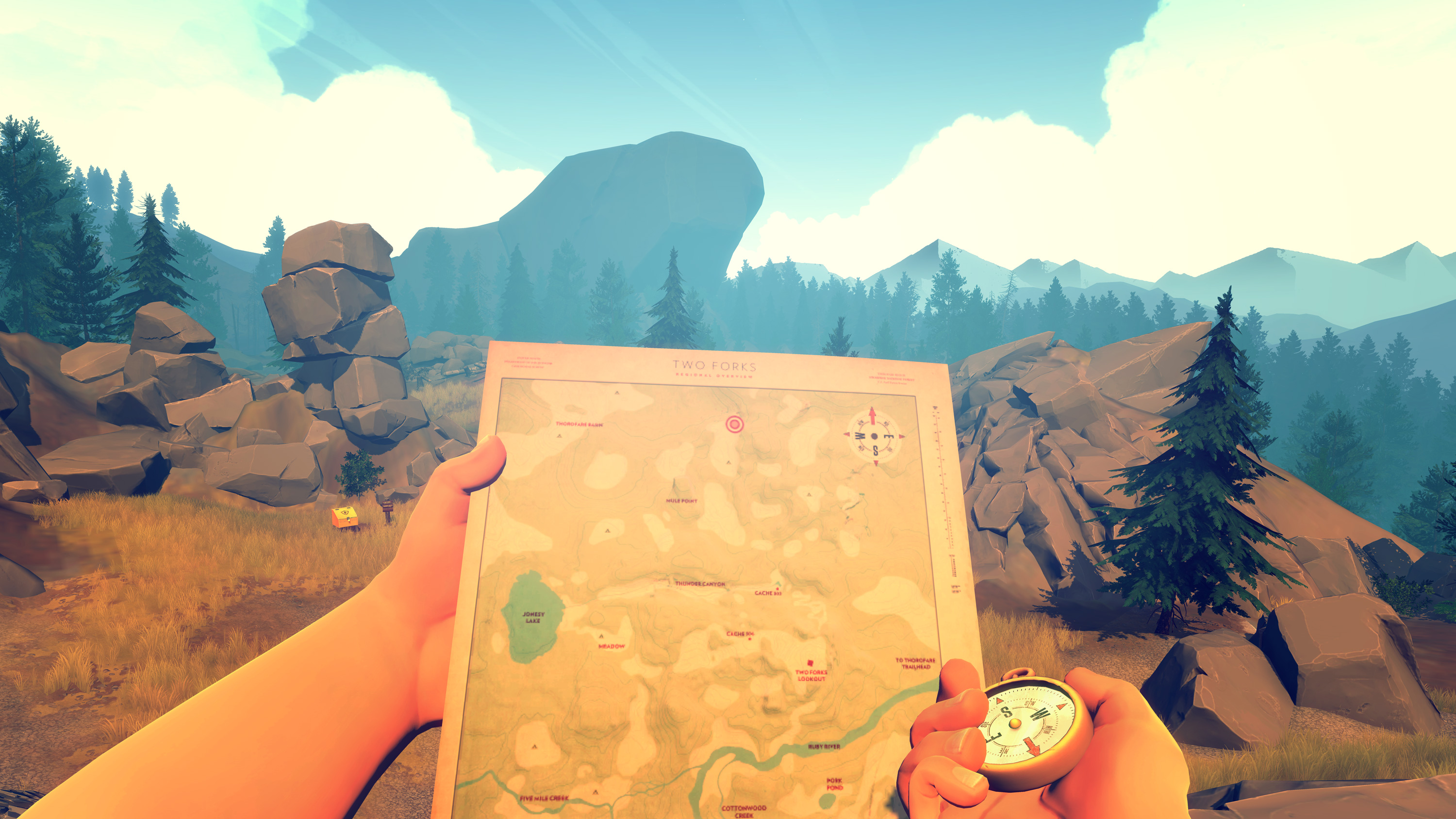
Camp Santo is made up of sort of an indie game dream team - designers and writers from great games like The Walking Dead and Mark of the Ninja, the composer of Gone Home, wonderful artists from Double Fine and some great pieces you've probably seen online, whether they were properly attributed or ripped off. Their first game, Firewatch, is about a man who decides to become a fire lookout at a national park for a summer, who spends his time attending to his normal duties and chatting on the radio with his supervisor at the next lookout tower over. Those conversations are really the meat of the game, as you figure out what sort of relationship you have with her, and try to find a connection to help make sense of what you're feeling. There are some simple interactions involving navigating and maintaining your section of the park, and a story that dips its toes into some unexpected territory. If you can get into the right mindset for the game, it's a very pretty and relaxing experience, with the emotional depth you might expect from the pedigree.
5. Dishonored 2 (Multi)

Everything Dishonored did well, Dishonored 2 matches. It has a unique, interesting setting that is built effectively through art design and background information you can find. It has solid core stealth and action mechanics that are augmented through a clever magical power system where you pick and choose the abilities that complement the play style you're going after. It has wonderful level design, where you find yourself navigating intricate city blocks and private estates, with different sections patrolled by different factions who will react to you in specific ways, and a great sense of freedom despite the generally linear progression, thanks to multiple paths and beneficial optional objectives. Unfortunately, the original's biggest weakness - a fairly dull plot that's not helped by pointless celebrity voice acting that generally comes off as bored - was not corrected. Still, there's a lot to be said for games that do anything as well as what Dishonored 2 gets right, and its levels are more consistently brilliant that the first time.
4. The Last Guardian (PS4)
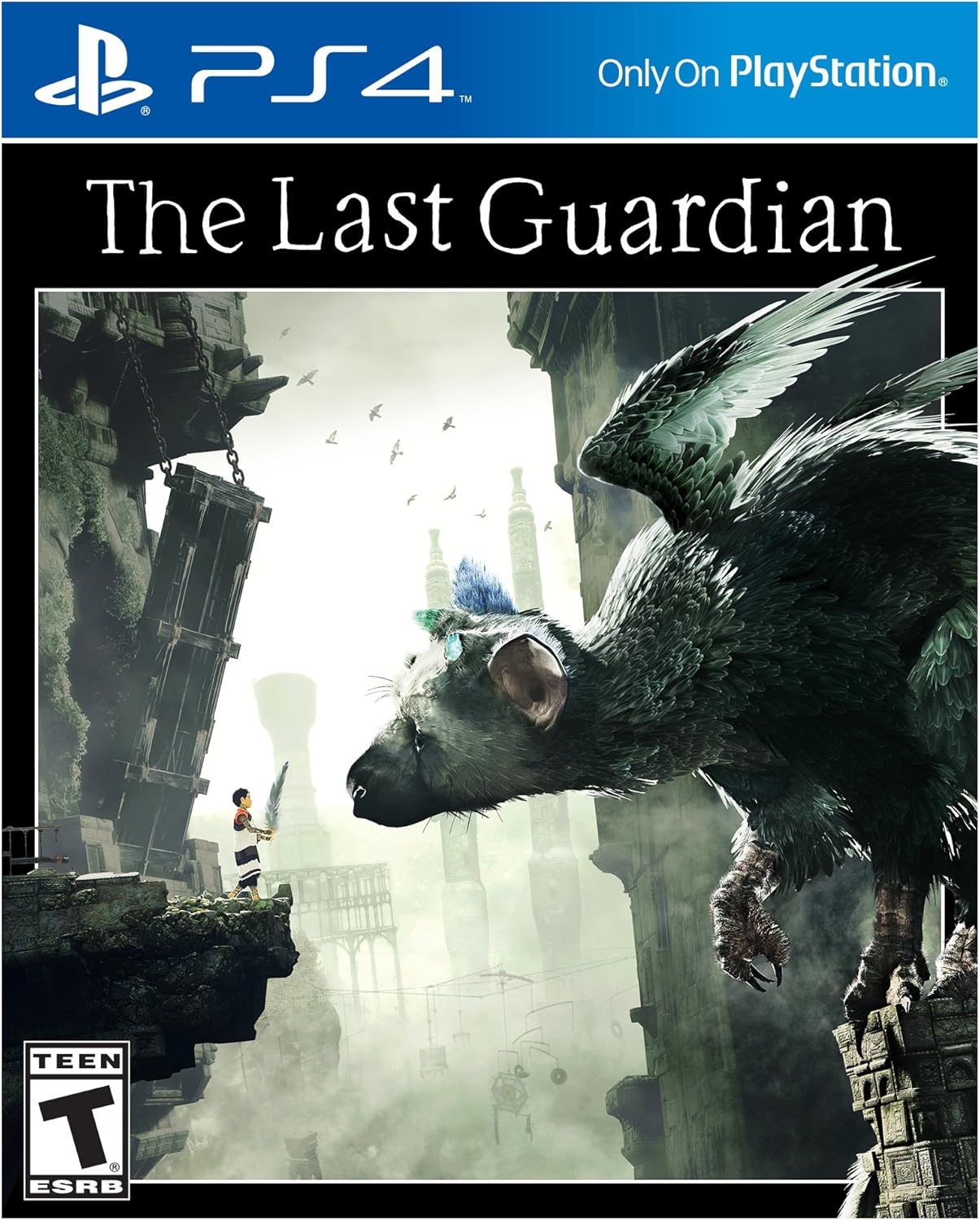
I'm a big fan of designer Fumito Ueda's two PS2 games, Ico and Shadow of the Colossus. So when they announced a new game by the same team for the PS3, I waited happily for its release. And waited. And waited. Over the years, the game stopped showing up at events, and seemed like it might die without ever coming out. It finally reemerged on the PS4, and last year, it actually came out. When you play it, you can see why it took so long - the technology behind an AI-driven, very large and detailed animal that climbs around environments while you can climb over it at the same time seems extraordinarily complex, and the frame rate is pretty bad in intense moments despite the hardware upgrade and long development cycle. The achievement itself was worth it, though. Trico, the strange bird/cat/dog creature you spend the whole game interacting with, is an incredible success on both a technical and artistic level. Many players experienced a lot of frustration getting it to do what they want, which is too bad. But if the relationship works, like it did for me, it's enough to overcome a whole lot of niggles about the way it controls and other details that could have been handled better. It's possibly the most flawed game on the list, but also the most magical.
3. Dark Souls III (Multi)
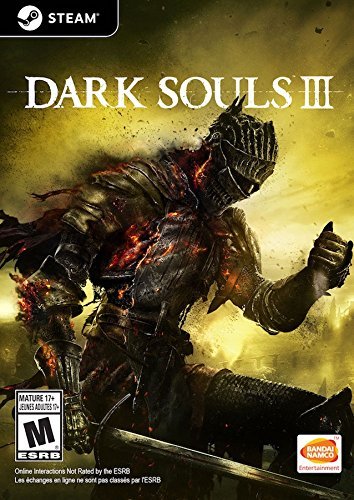
It definitely feels like there's some Souls fatigue going around for many. These are long, stressful games, and this is the third of its type in three years, and fifth in eight. For my own part, I had a great time with it. The Weapon Arts bring a new dimension to combat, the game looks wonderful (as wonderful as demon-infested medieval ruins can look, anyway), and they've ironed out most of the kinks that make the series less inviting for new players. It's still tough - if you've never played one of these before, there's a boss ten minutes in who will probably kick your ass. I'd still rate it as a pretty good jumping on point. The level design is excellent, and consistent in a way From Software hasn't pulled off before - there isn't a single area or boss I'd dread revisiting on a second time through. Fans of the first Dark Souls will continue to lament that they haven't recaptured the idea of a fully interconnected world since, and it felt like there were a couple of easy opportunities for those kinds of connections that they missed or just ignored. But the individual levels are still masterfully put together, with plenty of links and secrets to find, and they're populated by enemies that are always fun to square off against. As someone who never deviates far from a typical melee weapon build, I had very little to complain about.
2. Uncharted 4: A Thief's End (PS4)
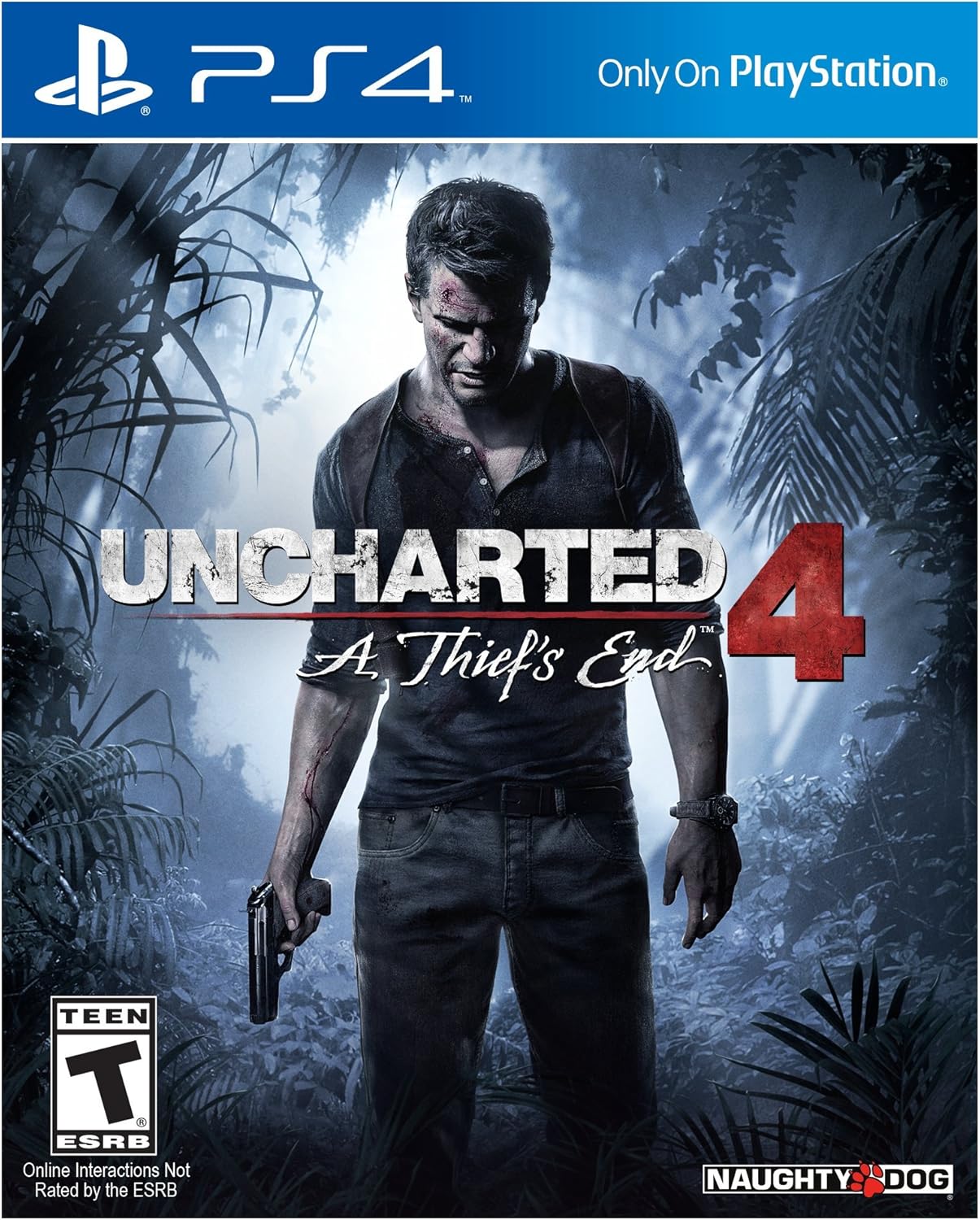
It seems like Naughty Dog is held to a different standard than other developers. They need more of a reason to revisit a concept, more justification to make a sequel. A fourth Uncharted game? After they switched things up with The Last of Us, it better be worth it. Luckily, they took a lot of what they learned from my favorite game of 2013 and used it to revive Uncharted in really interesting ways. This is probably the last game starring Nathan Drake, but it's a hell of a send off. It begins by introducing Nate's brother Sam, an idea which seems kind of schlocky. But they take the time to justify his previously unmentioned existence, and use it to create a story about Nate being torn between the obligation he feels towards his brother, who he had left for dead, and his responsibility to his wife, who he promised to give up his dangerous lifestyle for. This seems really heavy for an action game about climbing on cliffs and shooting bad guys, and it is, but they really take the time to pace it out and make it work. You feel invested in the characters in a way you probably weren't before, and everything feels weightier and more meaningful. It's probably pretty easily the least violent game in the series, and it doesn't feel like anything is missing. Plus, the action is still great and the graphics are incredible. People have doubts about a sequel to The Last of Us as well, but I'm totally on board for whatever they do.
1. Doom (Multi)

I've never played a Doom game before, and I really wasn't that interested in the new one. And when I first tried it, I had a good time, but I wasn't blown away. Once I sat down and really played it through myself, I totally understood why people were raving, and started considering whether I should try playing the original. It's just incredibly fun from start to finish. The graphics are nice and functional, the music is terrific (I can hardly fathom that they originally intended to have no guitars), and the story keeps you moving and laughing at the protagonist's disdain for everything happening around him. But it's the simple act of playing it that makes it the game of the year. You move through scientific facilities on the surface of Mars and dark corners of Hell, exploring to find hidden upgrades and blasting demons. Your arsenal of weapons and abilities and the variety of monsters that you deal with slowly expand as you come to understand how they all work. By the end, you're leaping around arenas, managing your ammo, brutally ripping enemies in half to refill your health, carefully timing the use of a chainsaw or a powerup to turn the tide of a battle, and making mincemeat of any freak that would dare to try to stop you. Not every game should be like Doom, but Doom is everything a game should be.
Delayed Entry
This is the best game that wasn't released in 2016 but I didn't play until then.
Donkey Kong Country Returns 3D (3DS)
I'm not going to lie, I didn't play a lot of older games last year. The selection for this was pretty thin. DKCR is a very good platformer, though. The 3DS version gives the player extra health to make up for the somewhat troublesome controls (the analog slider is really no good) and shuffles some of the postgame, but it's otherwise the same as the Wii version. It has a nice art style, it's challenging but gives you plenty of opportunities to avoid having to start entire levels over, and it has some pretty clever boss fights. It's the definition of a solid game.

I wasn't a big fan the last time I tried a Hitman game, and this one took me two attempts to get into it, but once I did I enjoyed it quite a bit. The game's not without any flaws, and its sense of design is aging rapidly. Still, the series has a unique style of play that's really interesting if you have the patience to get into it.
If you've never tried it before, it's a stealth action game, but instead of lurking in shadows and around corners to infiltrate secret bases, you're ambushing guards and stealing their clothes to hide in plain sight to get the drop on various assassination targets. There are several ways you can approach each mission, although usually only one perfect one that will get you the best rating. You can garrote or shoot enemies if you like, though there's often a more subtle way you can hit your objective without it being an obvious murder, like poisoning something they'll eat or rigging a chandelier to drop on them. It can be a little frustrating at first when you're just trying to get a feel for an area and don't know how to proceed, but it's usually not too long before you get an opportunity for a better outfit and an opportunity to figure out a game plan. And you can always just shoot up the whole joint if you want to, but that's never as satisfying as getting in and out without anyone noticing, especially since you're wasting money covering it up that could be better used upgrading your equipment.
For 2006 the game doesn't look or sound too bad, with adequate characters and environments and some decent music. The silenced pistols that I used for pretty much the entire game have a nice distinctive sound to them, and the rare explosions you'll set off are satisfying enough. The voice acting is mixed, with decent voices on the main characters but some utterly inexplicable ones from random people; and while the large crowd scenes are pretty impressive with the number of people on screen, however in those situations you'll quickly notice how small the number of unique models per area is. The game has some technical issues as well, besides a few odd physics problems I also ran into a couple crash issues, one that forced me to skip a cutscene and another that occurred during a mission, losing my progress.
The game's story isn't high art, but it has acceptable twists and turns for a decent action movie, and seems to tie in well with the previous games. It's set up with a couple of guys discussing some of Agent 47's previous jobs while implying that they've finally apprehended him, although when you look at it it's hard to believe they'd have to cover all of those situations sequentially in detail to get to the point, and I'm not sure the concept blends with some later reveals well. The credits sequence is another good example of what unique things can be done with the video game medium, and the ending sets up the now-confirmed sequel that I'm up to try out. When it comes out, I hope the design is a little more open, because we're in an age of player freedom in games and Hitman's reliance on one perfect path to complete the mission feels a little stifled by this point. Still, it was a fun if not amazing experience.